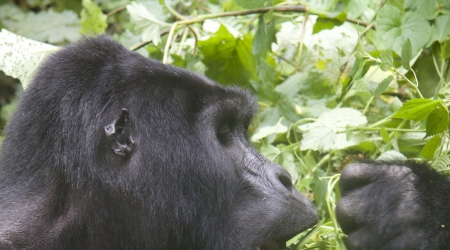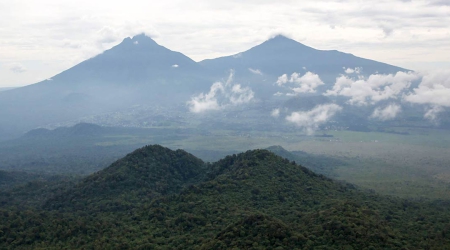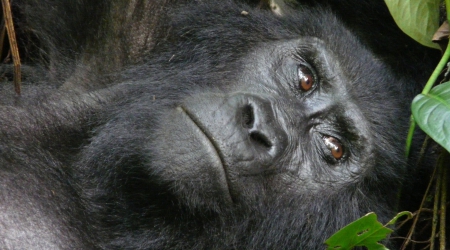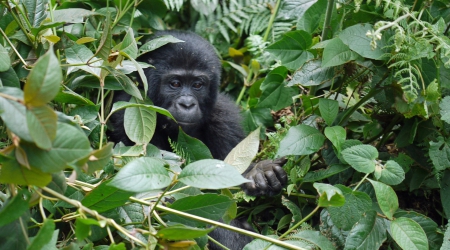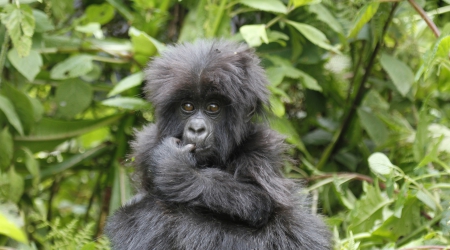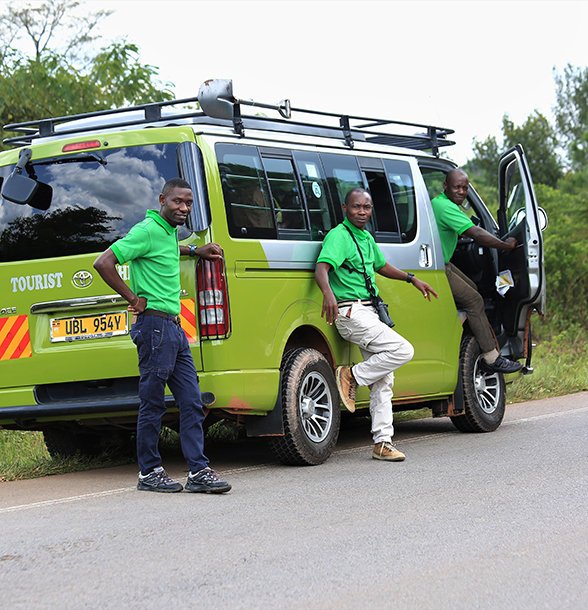Mountain gorillas are one of the two subspecies of eastern gorilla species. The Eastern lowland gorillas, also known as the grauer’s live in the Democratic Republic of Congo’s lowlands in Kahuzi-Biega National Park. Mountain gorillas, on the other hand, can only be found in three countries: Rwanda, Uganda and the Democratic Republic of Congo, in parks located within the Virunga Mountain ranges and Bwindi Impenetrable Forest. They can be found in Rwanda in Volcanoes National Park on the slopes of Mount. Karisimbi and Bisoke, in Uganda – Bwindi Impenetrable National Park and Mgahinga National Park and Democratic Republic of Congo in Virunga National Park.
The IUCN declared gorillas an endangered species in 2018 due to their dwindling numbers. Mountain gorillas are the “hulk” of apes; they are extremely strong primates with the strength of 5-8 adult human males. In terms of physical appearance, social interaction and way of life, they are strikingly similar to the human race. Because their DNA composition is 98% similar to that of humans, we can both be infected by the same diseases, which is why people with communicable diseases are not allowed to come close to them.
Gorillas are large animals, with males weighing up to 180kg and females weighing only 90kg. Males are polygamous in nature, which means they can have off springs from more than 5 females and raise more than 20 gorillas in their lifetime. Females have an 8.5-month gestation period and typically have their first pregnancy when they are 10 years old. Single births are a natural occurrence, as opposed to multiple births, such as twins, which are extremely unusual and rare among gorillas. When this occurs, it is cause for celebration.
They are herbivorous animals that eat fruits, roots, tree barks and occasionally slimy snails. Their excessive weight is the result of the long hours they spend eating. Their daily task is to eat for 6 hours straight. A peculiar behavior observed among gorillas is that when their babies die, they wait for the body to decompose before eating it. This cannibalism habit protects their living babies from being eaten by other animals who have become accustomed to eating the dead babies. Adults, on the other hand, are not eaten.
Gorillas are mature into adults once they turn 8 years old below that they are infants. When males are between 8 and 12, they are referred to as blackbacks and as they age beyond 12 years, they start growing silver-grey hairs on their backs hence being called silverbacks.
They live in families of 10-20 members that consists of more than 2 adult females, infants and blackbacks led by a dominant silverback, however they always face conflicts among members who fight for leadership and dominance, when a silverback is defeated and it doesn’t accept defeat, they normally go into exile hence finding some gorillas staying alone. The silverback in the family should be strong enough to protect the family from any kind of danger and attacks. Females’ roles are to take care of the family and infants.
A gorilla family sleeps together in nests that they build every day, either on trees or on ground. Since they are always moving from one place to another, they construct new nests wherever they settle.
They live in areas of 8000 t0 13000 feet high and they always go this high in search of their favorite food found within the vegetation found at such altitudes. This why they are also referred to as mountain gorillas and found in mountainous areas like the Virunga Mountain ranges. These areas are cold, but gorillas are fortunately covered with thick long fur that keeps them warm.
Just as each human has different fingerprints, mountain gorillas have different nose prints, their nose tips have different prints on them and this is how game rangers are able to identify them since they all look alike.
Mountain gorillas have been portrayed as calm creatures who become aggressive when attacked, as seen in the film “King Kong.” They are, however, shy and sensitive creatures, always ready to attack if they notice anything unusual that threatens to put them in danger. This is why they have been habituated to become accustomed to human presence, and rules have been established on how to behave when in close proximity to them.
When do gorillas get dangerous?
Gorillas become dangerous when you make eye contact with them. In the wild, eye contact is a sign of dominance, so if you make eye contact with them, they are likely to attack you in order to gain dominance.
Touching gorillas; Because they are habituated, they may come closer to you, but don’t be tempted to touch them because their protector, the silverback is always watching, so be cautious and don’t touch them because you may provoke the silverback into a fight.
Encroaching on their personal space; When you surround them too closely or block their path, they become frustrated and attack you.
Wearing bright clothing or reflective items such as sunglasses makes them curious, just like colored butterflies, so they are drawn to what they see and may want to learn more about what has piqued their interest.
What to do when a gorilla charges on you?
One of the most important things to remember when feeling attacked by a gorilla is to remain calm. Remain where you are, don’t run, don’t move or flex a muscle, and don’t make eye contact with it or another gorilla because this will demonstrate your submissiveness to the gorilla and it will eventually move on because gorillas love dominance.




